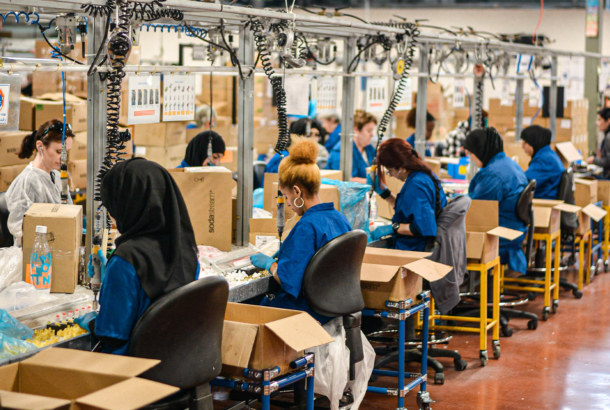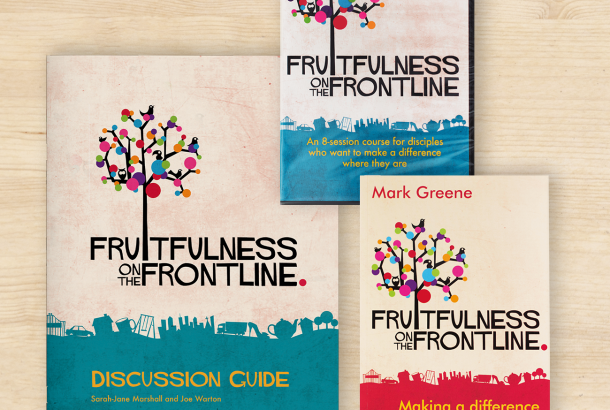Because of LICC | Chanelle Leher: Civil Servant of the Lord
Four ordinary Christians share their transformative experiences with LICC – and how God’s working through them today. A civil servant in the Department for ...
Read
We are currently experiencing technical issues with some of our video content. If you are unable to access a video, please email [email protected] for help.
Over the past 40 years, Stephen has worked advising governments and companies in power-related transactions. He’s been involved in deals that have had a huge economic and environmental impact. So why does he do his job? Spoiler: it’s not about the money, but rather the glory of God and the good of others. Read on to discover more of his story…
From childhood, it had been impressed on Stephen that he needed to do a job that would make a positive contribution to society – something that would make a meaningful difference, that would help further the common good.
After reading physics at the University of Oxford, he took a job in nuclear engineering. He designed new plants and equipment, and, in his words, he thought it was ‘the best job in the world’. Then came Chernobyl. This epochal explosion led to the decimation of trust in nuclear power. And, together with the discovery of North Sea gas, it became obvious nuclear power development would at least be paused for some time to take stock.
So, Stephen decided to draw on the skills and experiences he’d gained as an engineer and sidestepped into giving financial advice for the construction of power stations and gas lines. Since then, he’s been involved in a huge number of energy deals, and spends his days advising CEOs, government officials, and other big cheeses on all things power.
It’s a job that comes with huge responsibility, and it’s a responsibility Stephen takes very seriously. He recognises his deals have the potential to have massive economic, environmental, and personal impacts – so it’s important to try to get them right. As a result, he spends significant time considering the advice he’ll give companies. We’re called to do all we can to make a positive impact on the people and the world, wherever we are and whatever we do.
With all that in mind, when asked why he does his job, Stephen says: ‘Can I make a difference? Yes. Is it positive and constructive? Yes. I try to put the best that I have and am into my work underpinned by Christian principles of truth, integrity, and humility. I’m inspired by the example of Jesus. I work because I want to contribute to making our world a better place. That’s a motivation to get out of bed in the morning.’
For some, the words ‘positive contribution’ and ‘nuclear power’ don’t sit easily – how does Stephen reconcile the lives lost at Chernobyl with his choice of career? Well, Stephen does feel a strong need to act in good conscience and to promote good, fair, and just practices and business deals. Having dug deep into the mechanics of what happened at Chernobyl, he believes everyone in the nuclear industry has an obligation to consider and implement prevention strategies to prevent any future disasters. He remarks:
‘Especially as a Christian, you must look critically and honestly at these safety questions. It’s very important there are no more accidents – it would be wrong to just keep your fingers crossed and hope for the best just for reasons of toeing the line. The evidence shows that the actual risks are negligible, but the perceived risks can readily be fuelled by journalists and popular TV series: danger equals excitement, and so stories about the unbridled power of nuclear energy generate headlines and spark sales. But that said, we must respect the fact that some people are uneasy about the concept of nuclear power.
‘For example, the industry therefore builds power stations nowadays on pre-existing nuclear sites, away from population centres to reduce worry and fear. There is greater deference to these concerns today than, say, forty years ago, as government and corporations acknowledge a bigger picture perspective, not just to consider the economic benefits – there’s consideration of other stakeholders too.’
Stephen also notes that nuclear power, and electricity more broadly, underpin so much good – healthcare, food production, and heating to name just three examples. A sustainable and secure energy supply is foundational for the flourishing and functioning of society.
Aside from the pressures of big deals, what are the specific challenges Stephen faces as a Christian in a high-profile job?
Well, he notes that non-believers are inclined to think faith is a crutch for those who cannot face up to the world by themselves. This can lead to them questioning the strength of your character and leadership. We live in a deeply cynical society and are often judged by preconceived ideas about our faith rather than its lived reality. In Stephen’s words:
‘To announce your Christian faith in the workplace can often be interpreted as synonymous with admitting weakness. And, by and large, we like our leaders to be strong. But, for me, it’s okay to acknowledge that I’m not all-powerful and things happen that are outside of one’s control. My faith creates a reliable, decent, and consistent basis to react, whatever happens.
‘Though, I must say this is harder when you’re young and trying to build a career in a competitive environment – it’s much easier once you’re established in a corporation. It’s also a concern nowadays that Christians can be branded as intolerant. Sadly, some people find this narrative persuasive even though it is irrational as it directly contradicts our core directive to love our neighbours.’
He tries to let this shape his attitude towards all those he encounters in his workplace. After all, God works in and through us as we reflect his character.
In fact, this was how God drew Stephen to faith. He’d heard about Jesus whilst at school through daily chapel services and the witness of a friend, but had never given him more than a passing thought until he was at a stag do in his late 30s. The best man was animated and funny, but what was magnetic about him was his vibrant and joy-filled faith – a faith that spilled into every area of his life. He wasn’t rich in earthly terms but had true and eternal wealth because of his faith in Christ. What an amazing example of how God works through our actions and attitudes to draw others to himself, and to build his kingdom here on earth.
So, how do power-related transactions bring glory to God? Well, by spending his days scrutinising investment deals and labouring to maintain energy security in the United Kingdom, Stephen is investing in the kingdom. He tries to be a mouthpiece for truth and justice, making good work, modelling godly character, and using his gifts and talents to make this world a better place, and to point to the eternal hope he has in Christ – and this is our calling, too.
Stephen was speaking to Sophie Sanders, Marketing & Communications Executive, LICC

Four ordinary Christians share their transformative experiences with LICC – and how God’s working through them today. A civil servant in the Department for ...
Read

This article first appeared on Thinking Faith in April 2021 – There are very few people whose working lives have not been altered in some way over the cou...
Read

Make a difference wherever you are...
Read
| Cookie | Duration | Description |
|---|---|---|
| __stripe_mid | 1 year | This cookie is set by Stripe payment gateway. This cookie is used to enable payment on the website without storing any patment information on a server. |
| __stripe_sid | 30 minutes | This cookie is set by Stripe payment gateway. This cookie is used to enable payment on the website without storing any patment information on a server. |
| _GRECAPTCHA | 5 months 27 days | This cookie is set by Google. In addition to certain standard Google cookies, reCAPTCHA sets a necessary cookie (_GRECAPTCHA) when executed for the purpose of providing its risk analysis. |
| cookielawinfo-checkbox-advertisement | 1 year | The cookie is set by GDPR cookie consent to record the user consent for the cookies in the category "Advertisement". |
| cookielawinfo-checkbox-analytics | 11 months | This cookie is set by GDPR Cookie Consent plugin. The cookie is used to store the user consent for the cookies in the category "Analytics". |
| cookielawinfo-checkbox-functional | 11 months | The cookie is set by GDPR cookie consent to record the user consent for the cookies in the category "Functional". |
| cookielawinfo-checkbox-necessary | 11 months | This cookie is set by GDPR Cookie Consent plugin. The cookies is used to store the user consent for the cookies in the category "Necessary". |
| cookielawinfo-checkbox-others | 11 months | This cookie is set by GDPR Cookie Consent plugin. The cookie is used to store the user consent for the cookies in the category "Other. |
| cookielawinfo-checkbox-performance | 11 months | This cookie is set by GDPR Cookie Consent plugin. The cookie is used to store the user consent for the cookies in the category "Performance". |
| resource_download_valid | 30 days | This cookie is used to track whether or not you are able to download a resource. |
| viewed_cookie_policy | 11 months | The cookie is set by the GDPR Cookie Consent plugin and is used to store whether or not user has consented to the use of cookies. It does not store any personal data. |
| woocommerce_cart_hash | woocommerce_cart_hash | This cookie is used to store your basket information and is required to buy items from our website. |
| woocommerce_items_in_cart | session | This cookie is used to store your basket information and is required to buy items from our website. |
| wp_woocommerce_session | session | This cookie is used to store your basket information and is required to buy items from our website. |
| Cookie | Duration | Description |
|---|---|---|
| _ga | 2 years | This cookie is installed by Google Analytics. The cookie is used to calculate visitor, session, campaign data and keep track of site usage for the site's analytics report. The cookies store information anonymously and assign a randomly generated number to identify unique visitors. |
| _gcl_au | 3 months | This cookie is used by Google Analytics to understand user interaction with the website. |
| _gid | 1 day | This cookie is installed by Google Analytics. The cookie is used to store information of how visitors use a website and helps in creating an analytics report of how the website is doing. The data collected including the number visitors, the source where they have come from, and the pages visted in an anonymous form. |
| vuid | 2 years | This domain of this cookie is owned by Vimeo. This cookie is used by vimeo to collect tracking information. It sets a unique ID to embed videos to the website. |
| Cookie | Duration | Description |
|---|---|---|
| IDE | 1 year 24 days | Used by Google DoubleClick and stores information about how the user uses the website and any other advertisement before visiting the website. This is used to present users with ads that are relevant to them according to the user profile. |
| NID | 6 months | This cookie is used to a profile based on user's interest and display personalized ads to the users. |
| test_cookie | 15 minutes | This cookie is set by doubleclick.net. The purpose of the cookie is to determine if the user's browser supports cookies. |
| VISITOR_INFO1_LIVE | 5 months 27 days | This cookie is set by Youtube. Used to track the information of the embedded YouTube videos on a website. |
| YSC | session | This cookies is set by Youtube and is used to track the views of embedded videos. |
It sounds like Stephen has a really admirable approach to putting his faith into practice in his professional work. We need more people like that (hence LICC)!
I must say though that I found the comments about the risks associated with nuclear power a bit patronising: “the actual risks are negligible, but the perceived risks can readily be fuelled by journalists and popular TV series… But that said, we must respect the fact that some people are uneasy about the concept of nuclear power.”
Quite apart from the fact that Chernobyl wasn’t the only serious nuclear accident in living memory, there is also the toxic and radioactive waste: as Christians we are stewards of God’s creation and it seems poor stewardship to create stuff which lasts thousands of years which we have no way of ensuring will be maintained out of harm’s way. There’s also the eye-watering cost of nuclear power these days, compared to the plummeting cost of renewables. Opinions will differ but I don’t think it’s fair to say that those of us with our doubts about nuclear power are simply being manipulated by the sensationalist press!
Hi Martin, I was immediately drawn in by this fantastic article about Stephen.
In terms of true risk.
https://ourworldindata.org/safest-sources-of-energy
Nuclear is the safest form of energy that we have ever devised (including the accidents that you mention). And Stephen is one of the people who is helping to ensure that it is even safer than ever.
In terms of waste. This can actually be a resource. But the amounts in question are so tiny. All the nuclear waste ever produced would fit in one football field 5 meters deep.
The eye watering cost of nuclear is due to over regulation (S.Korea managed to build 4 reactors to time and budget in the UAE). And it sounds like people like Stephen are helping to bring those costs down.
Plummeting costs of renewables is as a result of partial accounting. They are not dispatchable power, and true dispatchable power sources have to bear the cost (through government mandate) for their intermittency. If they were required to be fully costed (available when needed), they do not meet the lifecycle threshold for competitiveness.
Ignoring all of that, I was deeply inspired by someone bringing their Christian faith into the workplace and will be sharing at my work.
Thank you,